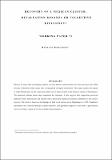| dc.contributor.author | Rabellotti, Roberta | |
| dc.coverage.spatial | Mexico | en_GB |
| dc.date.accessioned | 2014-01-22T14:04:31Z | |
| dc.date.available | 2014-01-22T14:04:31Z | |
| dc.date.issued | 1998 | |
| dc.identifier.citation | Rabellotti, R. (1998) Recovery of a Mexican Cluster: Devaluation Bonanza or Collective Efficiency? IDS Working Paper 71, Brighton: IDS. | en_GB |
| dc.identifier.uri | https://opendocs.ids.ac.uk/opendocs/handle/20.500.12413/3389 | |
| dc.description.abstract | Mexico, as many other developing countries in Latin America and elsewhere, has been moving in the 1980s
towards a liberalised trade regime after a long period of import-substitution. This paper analyses the impact
of trade liberalisation on the
cooperative behaviour of firms located in the footwear cluster of Guadalajara.
The empirical evidence shows that
cooperation has increased. It also suggests that
cooperation positively
influences firms' performance and together with a favourable market environment contributes to the cluster's
recovery. The study is based on the findings of
field work carried out in Guadalajara in 1996. Qualitative
information was collected through in-depth interviews and quantified responses came from a questionnaire
survey covering a sample of 63 shoe manufacturing enterprises. | en_GB |
| dc.language.iso | en | en_GB |
| dc.publisher | IDS | en_GB |
| dc.relation.ispartofseries | IDS working papers;71 | |
| dc.rights.uri | http://www.ids.ac.uk/files/dmfile/IDSOpenDocsStandardTermsOfUse.pdf | en_GB |
| dc.subject | Industrial Development | en_GB |
| dc.subject | Trade | en_GB |
| dc.title | Recovery of a Mexican Cluster: Devaluation Bonanza or Collective Efficiency? | en_GB |
| dc.type | IDS Working Paper | en_GB |
| dc.rights.holder | Institute of Development Studies | en_GB |
| dc.identifier.koha | 112399 | |

